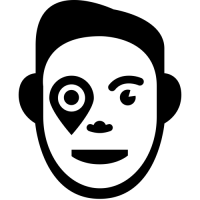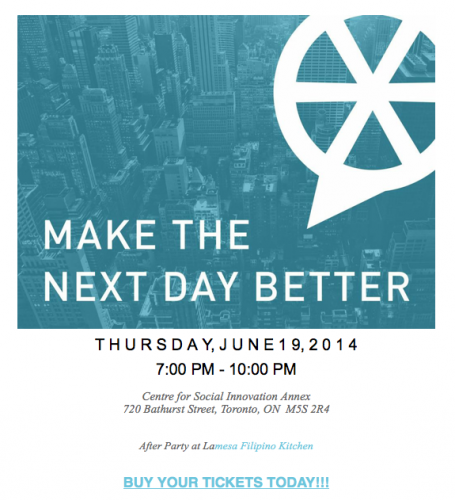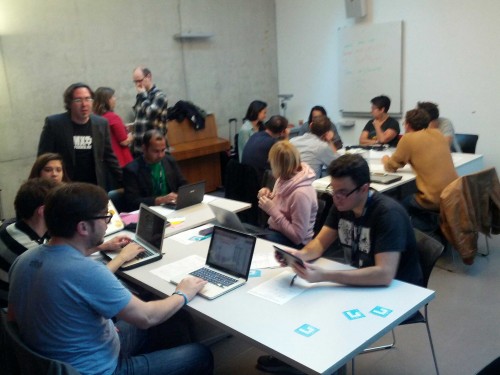[Cross-post from
Humanitarian OpenStreetMap team blog.]
All spring we’ve been thinking about how to grow and support the HOT community. We know that we need to improve support to keep up the momentum of the last year while balancing quality great work around the world. At the State of the Map US event, we held a HOT BoF (Birds of Feather) session with over 45 participants. It is a small section of the wider global community, but it gave us a chance to see old friends, meet with partners and potentially engage new mappers.
Our conversations touched on recent activations, how to get involved, types of community members, teaching tools/methods, partnership engagement, working with imagery providers and, of course, UAVs.
How to Get Involved:
- Join OSM, visit LearnOSM.org, watch MapGive videos
- Join HOT mailing list, IRC
- Pick a Task from Task Manager.
HOT’s community is gearing up. We have been doing some deep tissue analysis on how to improve in our HOT community Sprint. We recognize that there several distinct groups within our community who have particular needs that are unique to that group. These core types include connectors/teachers/organizers, mappers (many types), partners/mission supporters, techies, and, lastly, those involved in the business of mapping/data consumers/supporters.

Activations
HOT has been activated many times in the past year with the largest activation Typhoon Haiyan (Philippines). The wider community works with official and unofficial partners to respond such as the American Red Cross, Medecins Sans Frontieres, USAID, HIU, CartONG, and the World Bank’s Global Facility for Disaster Risk Reduction and Recovery. Some session feedback included that HOT needs to get better with a structured owners and workflows for contact while capturing the partners needs.
To improve the quality of data, we need better activation specific training to help compare before and after imagery sets, plus local context guidance. One participant advised that they would like iD (the main editing tool at OpenStreetMap.org) with a swipe function to see the before and after imagery. For remote mapping, there needs to be more training tools to help improve the first edit. But, there needs to be a validation process. While it might be time-consuming, it might be beneficial to have a Tier 1 – 4 process to improve quality checks and provide mentorship. Mentorship is actually already happening, but this would allow us to formally recognize leaders more. Map Roulette might provide a way forward on this to be able to pull out the data that needs a second or third review.
UAVs
From imagery to drones, trying to solve the equation of how to get quality and as close to real-time data was very much on our minds. HOT has received some UAV imagery but has much caution in getting involved in UAV data collection as… there are problems with getting clearance for airspace, and technical work to patch together a mosaic for tracing. Add to this the complexities of liability issues and the risk to volunteers on the ground who could be accused of espionage (as has happened to other humanitarian volunteers). The level of resolution is an issue. We are currently looking at buildings and infrastructure – but there’s a lot more to look at that have : what if UVA derived detailed imagery was made available? What scenes would be made public to all parties? Who would be making vulnerable? What about all the privacy and security issues? What about the safety of the vulnerable should a drone be tampered with or crash.
The Sexy, Unsexy stuff
In terms of documentation, just like the wider Humanitarian field, HOT needs to build a research environment to create case studies from end to end. These need to include items like how to make something repeatable. HOT also needs a research arm to help tell the stories and analyze the progress to help guide any changes.
HOT needs are project managers for the tools and products that we produce within the community. All of our products needs to be translated and up to date. These folks are most welcome to join the Technical Working Group.
The Sexy, Unsexy stuff
In terms of documentation, just like the wider Humanitarian field, HOT needs to build a research environment to create case studies from end to end. These need to include items like how to make something repeatable. HOT also needs a research arm to help tell the stories and analyze the progress to help guide any changes.
HOT needs are project managers for the tools and products that we produce within the community. All of our products needs to be translated and up to date. These folks are most welcome to join the Technical Working Group.
Some of the unsexy things (thanks Robert Banick for coining it) that are needed are: documentation, policy, health and safety and more. Our friends and members from the Red Cross advised that we publish internships and volunteer roles on our website to a wider outreach. We have many mappers in our network, now it is time to grow the support areas.
Building Map Literacy, One Edit at a Time
One the other end, Map literacy is hard to do in an emergency. Proactive map projects like HOT Indonesia show that this type of knowledge sharing and capacity building is much more effective done in advance. The same methods apply for our Humanitarian organization partners. As we working more pre-disaster, we’ll have better data about the risks – the balance of working on basemapping vs. damage assessment will shift and this will change the game.
One day we’d like to have all the active community participants and Board members in the same room. Until then, we are very lucky to HOTties meet and share. HOT’s community is just a small corner of the wider OpenStreetMap community. We are fortunate to have opportunities to meet. Thanks to the HOT BoF participants and State of the Map US for giving us a place to connect.
Some Resources
Authors: Heather Leson and Mita Williams
Images are in the Public Domain via the Noun Project





